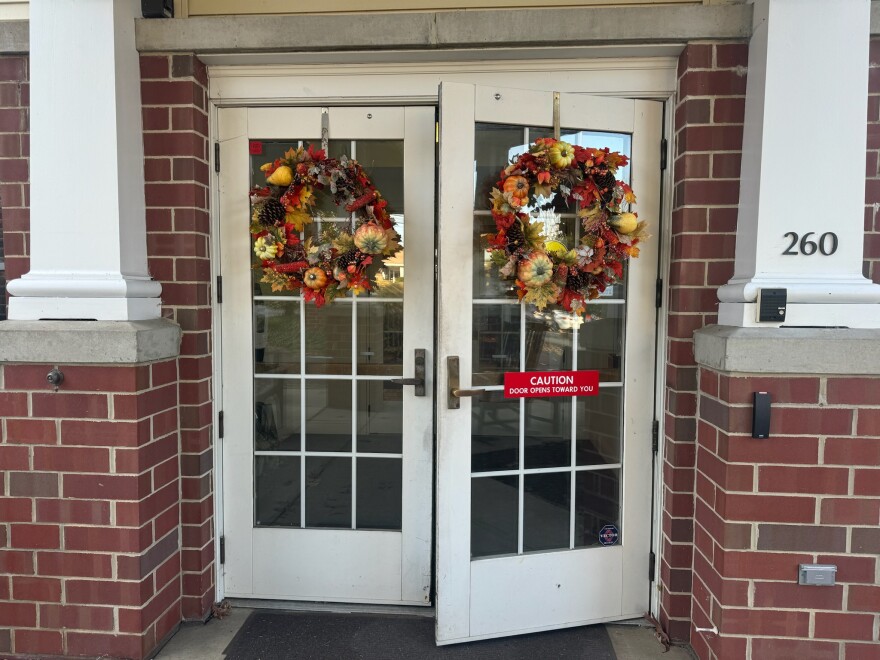Allied Services' growth contradicts a national trend of struggling nursing homes.
According to the American Healthcare Association, the majority of nursing homes are struggling to recover their workforce in the wake of the pandemic.
The downward trend expands to quality of care. According to analysis from the Kaiser Family Foundation, the number of nursing facilities dropped by 4% between 2015 and 2023, and facility residents dropped by 12% in that same time.
This fall, Allied Services celebrated its five-year acquisition anniversary of Little Flower Manor, St. Therese Residence and St. Luke’s Villa from the Diocese of Scranton. All of them are located in Wilkes-Barre.
Little Flower Manor and St. Therese Residence combined to become the Meade Street facility, and St. Luke’s Villa is now Allied’s Center City Skilled Nursing facility in downtown Wilkes-Barre.
Investments over the past five years focused on both cosmetic improvements and benefits for employees.
The investments allowed for staff growth, staff raises and the ability to take in more residents. According to Bill Conaboy, Allied Services' president and CEO, the staff has nearly doubled in the past five years of Allied’s ownership.
Allied said it retained 185 staff members through the change in leadership. Since then, the staff has grown to 350, supporting service expansion and increased bed capacity.
A hospice care center opened at the Meade Street facility since Allied's ownership. The staffing increase reflects this new service, as well as a near 20% resident increase at the Center City location.
Hailey Williams, a staffing efficiency manager, worked at Allied Services’ Meade Street location in Wilkes-Barre’s Heights neighborhood for 12 years. Seven of those years were spent under the Diocese of Scranton’s leadership in what was formerly Little Flower Manor.

At first wary of the changes to come, Williams now sees room for career growth for herself and others.
She started at Little Flower Manor as a recreation therapy aide and moved to her management position under Allied's leadership. With new employee benefits such as higher pay, frequent raises, tuition reimbursement and CRN classes offered, Williams sees more people being drawn to work at Allied’s Wilkes-Barre facilities.
“It's a great company, and there's room for growth,” she said. “So it doesn't matter what position you're in in the company, you could go back to school. They'll help you. You could do something to better yourself, no matter what position you're in.”
When the diocese decided to sell the properties in 2019, they were hot commodities for buyers both in and out of state.
“There was a very robust market for skilled nursing facilities throughout the country, and so when the Diocese of Scranton made the decision to sell these facilities, they had a lot of offers, and some of them from bigger national firms,” said Conaboy. “The diocese and the bishop made the decision to choose Allied Services because we're a local not-for-profit, and much more so because of our reputation for excellence in healthcare and compassionate healthcare, the same goals, the same reputation as the Diocese of Scranton.”

The diocese confirmed it chose Allied as the buyer because of the alignment of values and Allied’s commitment to preserving some aspects of the faith-based service the diocese offered.
“After much due diligence, the diocese selected Allied Services to carry on its legacy of quality care at all three facilities, and over the last five years, has watched as many meaningful improvements have been made to enhance the lives of residents,” the diocese said to WVIA in a statement. “We also commend Allied Services for the exceptional care it took to keep residents safe during the COVID-19 pandemic. As we mark the five-year anniversary of the sale, the diocese remains grateful that Allied Services followed through on its promise to continue meeting the spiritual needs of residents, offering the opportunity to participate in Mass regularly, which was very important to us from the outset of the sale process.”
Allied preserved the chapels in the facilities, where residents can attend services at least weekly. While keeping the chapels fulfills Allied’s commitment to the diocese, it also helps residents feel more at home.
“Individuals, if they choose, would have the ability to come down and have a quiet space and perhaps have Mass and a priest, which we have here as well," Conaboy said. "So we did make that commitment, and we're happy we did.”

Allied's plans were derailed once the coronavirus pandemic hit just months after the acquisition.
“All those commitments we made were put on hold because we shifted gears and had a focus on keeping people alive,” Conaboy said.
However, Allied continued construction and renovations throughout that period. Conaboy is hopeful for the future, especially since so much progress was made even with a global pandemic disrupting much of the first five years of ownership.
“Throughout COVID, we continued with the renovations that you see today, and very fortunately, as we came out of it now, we're finishing those renovations, and our census is increasing, and the number of employees that we have is increasing, so we're coming out of it strong,” he said.
The near $20 million investment into the facilities allowed for modernization of all three facilities. Construction is still ongoing but expected to wrap up soon. The renovations so far include updated rooms and more amenities for residents, such as gyms and common spaces like game rooms and movie theaters. There are also more comfortable living room type areas for families to gather outside of resident rooms.

Allied started a residency program in an effort to continue retaining healthcare professionals, a residency program was started three years ago under Allied’s leadership.
“We have a residency program here now where we train young doctors,” Conaboy said. “That means a lot to our patients. Our residents that will be training [as] these future doctors that hopefully will stay in our area and become part of our system.”
Conaboy said he feels grateful to look back at the past five years of work and reflect on what’s been done and what’s to come.
For him, the acquisition is just a part of the overall goal of, “We want people in this area to have the same access to quality care that others in our region and in our country have.”










